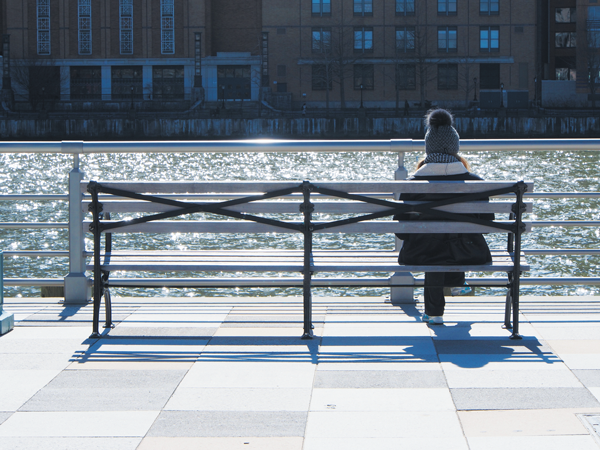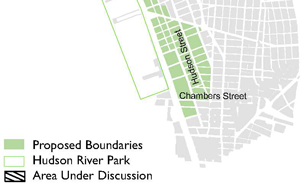

BY JOSH ROGERS | No one would ever confuse liberal Tribeca with a hotbed of the modern Tea Party movement, but nevertheless some neighbors are beginning to use phrases like “no taxation without representation,” more and more.
The west side of the neighborhood is objecting to a proposed tax that would help fund maintenance of the Hudson River Park.
The business improvement district, the Hudson River Park Neighborhood Improvement District or NID, would be roughly within three blocks of the park, and extend well beyond Tribeca, from Chambers St. up to 59th St.
One of its opponents, Nicole Vianna, does not buy the argument that waterfront property is more valuable, particularly in light of Hurricanes Sandy and Irene.
“They all had damage from Sandy,” Vianna said of western Tribeca. “Are people saying ‘oh please, can I buy in an area that’s been flooded twice in two years?’ ”
Vianna and many of her neighbors came to last week’s Community Board 1 meeting to voice opposition, and will undoubtedly be at the board’s next Tribeca Committee meeting, Wed. Feb. 13, at 49-51 Chambers St., 6 p.m.
The committee’s chairperson, Peter Braus, is a member of the NID’s sponsor, Friends of Hudson River Park, and defended the proposal at last week’s meeting.
“I am certainly opposed to the public paying for a park,” said Braus. “I’d love nothing more than if Mayor Bloomberg and Gov. Cuomo opened up their checkbook tomorrow and paid for the whole thing. But guess what folks? It ain’t going to happen.”
He pointed out that the tax, 7.5 cents per square foot of property, would work out to be only about $100 a year for a 1,000 square foot condo when you include a building’s common areas.
“For a lot of people who live in this neighborhood — $100 per year is not a hardship… If you could say to everyone who uses the park, ‘you kick in a $100…and the park will be in better shape,’ I don’t know too many people who would say, I’m not going to do that.”
One may be his neighbor and colleague on the board, Tricia Joyce.
“Maybe there’s a box we all drop a dollar in and there’s your $17 million,” she said, referring to the estimated number of visitors.
She called it “capricious” that only some visitors would pay for the upkeep.
“This is a park that people bike through that live in Brooklyn and Harlem and Staten Island,” she said. “This is a destination park now. It does not only serve the people in the community.”
A.J. Pietrantone, who is leading the NID effort as executive director of the Friends group, said about half the park’s visitors live nearby and “we have to draw the boundaries somewhere.”
Opponents point out that the proposed district excludes much of Hudson Square because that is already part of a different BID, and that commercial and home renters would pay the tax indirectly. A co-op building would only get one vote toward representation, but condo owners would each get one vote.
Pietrantone said that’s tied directly to the legal differences between the two types of buildings.
He said the NID would generate $10 million to help with the park’s upkeep. About $1 million to $1.5 million would be used to improve and maintain the plantings that are technically just outside of the park — along the bikeway and in between Route 9A. Overall, about 40 percent of the funds would go to projects outside the park.
Community Board 1 gave initial approval to the plan in December, but it will get a more formal presentation later in the year, assuming the proposal is certified by the city Departments of Small Business Services and City Planning.
In addition to Joyce, a few C.B. 1 members voiced skepticism about the proposal last week, so it’s not clear if the board would endorse the plan again.
The affected community boards and the borough president will have advisory votes before it heads to the City Council for final approval.
Pietrantone said he thinks the plan will get to the Council by fall.
Councilmember Margaret Chin, who represents Tribeca, has supported BIDs in Chinatown and Soho, but has not yet taken a position on the NID.

































